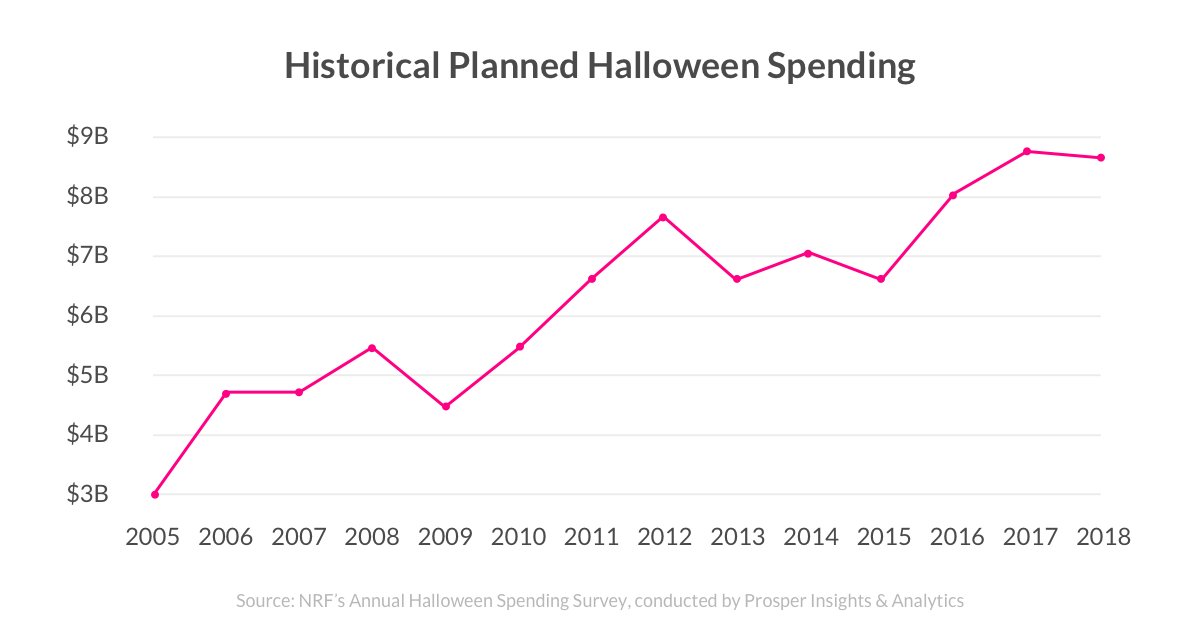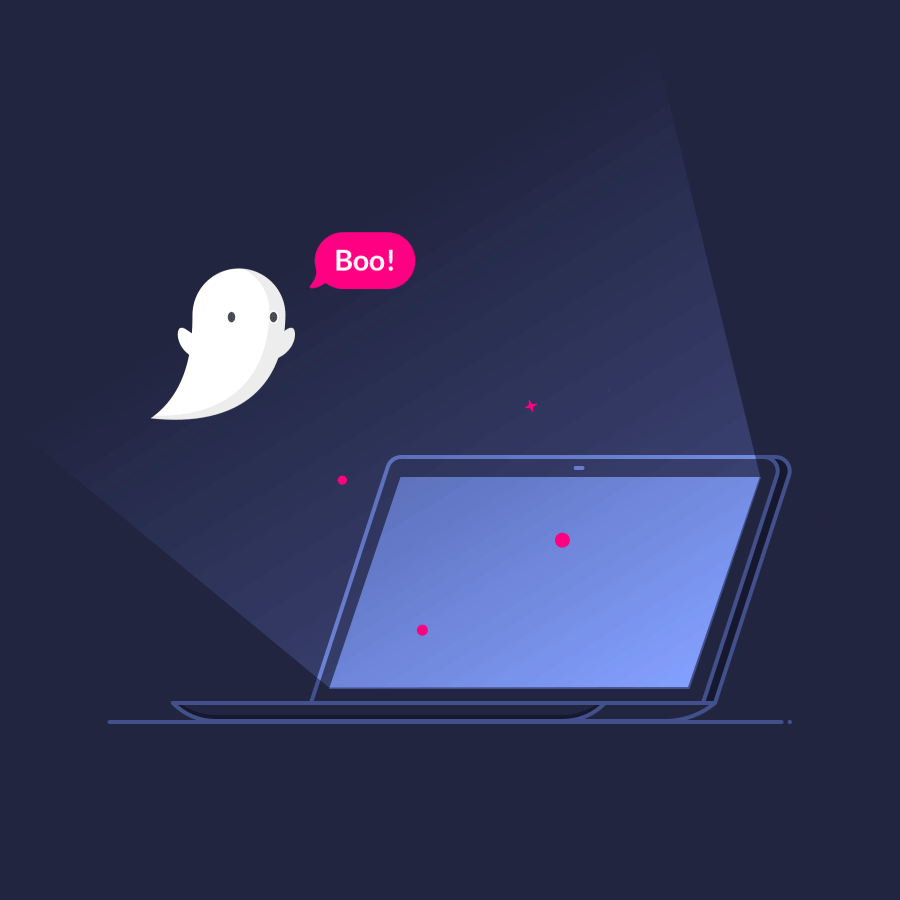It’s pumpkin latte season and that means Halloween is upon us. Some of us have been planning our costume for the last 12 months. Others are planning their October 31st hibernation and waiting for it all to be over.
Either way, you may find yourself screaming when hit with the answer to this trivia question: How much money are Americans spending on Halloween?
Answer: This year, Americans will spend $9 billion dollars on candy, costumes, and Halloween decorations. (National Retail Federation) That’s an average of $87 per celebrant. Scary.

Notwithstanding what Halloween tribe you’re in (in favor of spooky celebrations or vehemently against), there’s no denying that it’s a pretty hefty number. With that $$, you could buy 17 morning coffees or 67 packs of gum.
Forking out the kind of money isn’t a small decision. And as with a lot of our financial decisions, it isn’t always the most rational. So why do more than 175 million Americans allocate a hefty chunk of cash for one night of festivities? Turns out, it’s rooted in pure science.
1. Halloween buys you an experience
Experiences bring us more happiness than things, according to several psychology studies. A recent study at Cornell University found that experiential purchases (money spent on doing) tend to provide more enduring happiness than material purchases (money spent on having).
In other words, you’re most likely to be happier for a long time forking out cash on a 2-week vacation than on the latest iPhone.
The study goes further, and looks at hedonic differences pre-consumption. Here, too, researchers found that people derive more happiness from the anticipation of experiential purchases (“can’t wait to read my book on the cruise ship!”) than material purchases (“can’t wait to get those sunglasses!”). Waiting for an experience is even more pleasurable than waiting to receive a material good.
Halloween, in this context, is the quintessential experience. Planning out your costume, compiling accessories, and penciling in parties are all things you anticipate for weeks (or even months) in advance.
Take a minute and think about past Halloweens when you completely nailed that costume: Studies show that when we reflect back on purchases we made, experiences make us happier than possessions.
It’s interesting to dwell on that: Experiences are often fleeting, over-and-done kind of events, like short vacations, a wedding, Halloween, etc. So when you buy a new TV, you’re probably thinking that you’re investing in something you’ll hope to have for a while.
But science shows we develop hedonic adaptation (read: a tolerance to things). Meaning, when we’re constantly exposed to our clothes, Airpods, or TV, their meaning to us diminishes, and they just become fuzzy in the background.
It’s precisely the fleetingness of Halloween that makes us want to invest time and money into it, and cherish the experiences it produces for a long time after.
2. Vying to be the best, at all costs
Things get competitive on Halloween, to a point where it reverses what traditional economists call ‘free rider problem.’
This theory assumes we’ll all spend less when we think our neighbors or governments will take on the expense. In other words, there’s almost zero incentive to spend money on something if we can enjoy its benefits without spending at all. Think: maintaining a public park, or accessing clean water. Many of us are lucky to have ‘free’ access to these things without spending much (often, this is where taxes come in).
But when it comes to Halloween, this theory doesn’t hold. We can’t really participate in Halloween unless we fork out cash for costumes, decorations, and candy. In fact, quite the opposite: We have to spend in order to participate (unless you’re master of DIY costumes and decor). This, coupled with inevitable competitiveness, leads to overspending.
Everyone tries to outdo the other when it comes to decorations, parties, and even the type of candy you’re handing out for trick or treaters.
![]()
The point here is to have the “best” costume, or the “most haunted” house, and win first place in a costume competition- often times, at all costs.
3. Everyone’s (over)spending
When we were kids, we all heard our parents/teachers say, “if all your friends jump off a bridge, would you do it too?”
Those naggy adults were trying to convey the idea of social proof. That’s social psychology speak for looking to others to figure out how to act in a given situation.
When we’re unsure how to behave, we look to others for information or cues. If everyone around us is doing A, we’re likely not to do B. This kind of influence is called ‘informational influence.’
Social proof can also describe ‘normative influence,’ or the pressure to conform in order to be accepted or liked. So if all your friends order matcha ice cream, but you prefer vanilla, you’ll probably end up ordering that green tea treat so you can fit in with everyone else.
Whatever the motivation behind social proof, it often leads to ‘herd behavior:’ Everyone’s getting into this Halloween thing, so I’ll follow the herd and get in costume too. Sound familiar?
Social media has a big role to play, too. We know our friends and family will upload their costumes and trick or treating escapades, so we’ll have the urge to overspend to conform to what they’re is doing. Pro tip: If you’re not into this Halloween thing, get off Instagram.
4. Being scared makes us happy
Yeah, you read that right. Science shows that feeling scared causes the release of dopamine, a neurotransmitter that makes you feel good.

Take this recent study, where researchers examined why people proactively buy tickets to go to haunted houses or watch horror movies. Researchers took a look at volunteers’ brain activity before and after their haunted house trip, and discovered that getting scared in a controlled environment (Halloween!) has its health benefits.
Being scared is a high that gets your dopamine (read: feel-good chemicals) going and is usually safe for you, as you instantly realize you aren’t in any real danger. In fact, the volunteers reported feeling less anxious and tired after their haunted house trip: they ran out of the houses terrified, but also laughing.
Moral of the story? People pay to get scared, because it gives them an instant rush. Cue the obsession with outrageously pricey Halloween costumes.
Fear and Fantasies
Whatever our spend will be this Halloween, it’s clear that this day of ‘trick-or-treat’ is exactly that: we’re treating ourselves to 24 hours of exaggerated and hyped up fun (and sugar), and our brain will trick us to behave in ways we’d never dream of any other day.
As it brings out our fears and our fantasies, we’ll be (irrationally?) swiping our credit card to fully participate in the festivities. Happy spending.